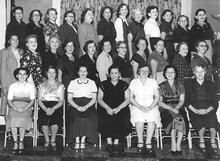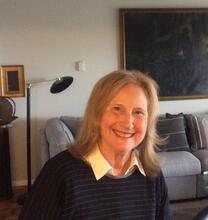Minnie Low
Minnie Low pushed for new kinds of aid such as vocational training and loans that made the needy self–sufficient, at a time when social work usually meant wealthy people donating to the poor. Low co-founded the Maxwell Street Settlement House in 1893, beginning a lifelong friendship with Jane Addams of Hull House in the process. Later, Low became executive director of the National Council of Jewish Women’s Bureau of Personal Service, where she helped immigrants find housing, loans, legal aid, and medical care and ran a workroom where workers were paid in essential goods. In addition, Low led and volunteered for a dozen organizations, from the first Juvenile Court of Chicago to the Jewish Home Finding Society, an adoption agency.
Known as the “Jane Addams of the Jews,” Minnie Low was a leader in the Jewish social service community. Born in New York City, on November 9, 1867, Low was the second of six children. When she was ten, Low’s family moved to Chicago, where she completed grammar school. Unfortunately, she was forced to leave South Division High School during her first year due to poor health.
Maxwell Street Settlement House and the Seventh Ward Bureau
Low’s first foray into the field of social work occurred during the 1893 economic depression when she co-founded the Maxwell Street Settlement House, an agency that served the needs of Eastern European Jewish immigrants in Chicago. Her lifelong friendship with social worker and Hull House Settlement director Jane Addams began during this period; the initial planning meetings for the Maxwell Street Settlement House were held at Hull House.
While organizing the Maxwell Street Settlement House, Low was employed as secretary to Hannah Greenebaum Solomon, the philanthropist and social reformer who founded the National Council of Jewish Women (NCJW) in 1893. When Solomon and other members of Chicago’s NCJW founded the Seventh Ward Bureau in 1897, later known as the Bureau of Personal Service, they appointed Low as executive director, a position she held until her death twenty-five years later. Under Low’s direction, the organization helped immigrants to secure housing, medical care, legal aid, and loans. Although Low described the bureau as nonsectarian, the vast majority of the agency’s clients were Russian Jews.
The bureau’s goals and activities reflected Low’s philanthropic philosophy. An adherent of scientific philanthropy, a popular late nineteenth-century philanthropic approach that emphasized the importance of helping the poor to become self-sufficient, Low discouraged bureau workers from dispensing monetary relief to their poor clients. Low viewed alms as psychologically degrading as well as dangerous to the poor because they encouraged dependency.
In addition to its goal of encouraging initiative and responsibility among the poor, the bureau was committed to maximizing efficiency among Chicago’s social service agencies. The bureau conducted investigations of people who applied to other agencies such as the Woman’s Loan Association, the School Children’s Aid Society, Hull House, and Henry Booth House. The purpose of these investigations was to make sure that applicants were seeking aid for “worthy” purposes and that they were being truthful about their dire financial situations.
Scientific philanthropy
All of Low’s philanthropic endeavors were shaped by her belief in scientific philanthropy. She was an advocate of friendly visitor programs whereby indigent people were provided with the counsel and friendship of middle-class women rather than with monetary doles. Under the auspices of the bureau, Low created a workroom for women where workers were paid for their labor with coal and secondhand shoes and clothes. Similarly, Low was committed to providing the poor with loans rather than with conventional alms. For Low, loans preserved recipients’ dignity, while monetary gifts were humiliating. In a 1905 essay on philanthropy, Low wrote:
Loan a small amount to a man struggling for existence...let him at the same time repay the loan in small installments, without flinching, and without shirking his responsibility, and what greater proof do we require that undaunted courage, ambition, honor, and manliness are virtues of the poor? (Bernheimer: 97).
Low transformed her beliefs about the merit of loans into practice when she helped found the Woman’s Loan Association in 1897. Beginning with eighty-seven dollars in its treasury, by 1918 the loan society was disbursing as much as thirty-three thousand dollars per year in interest-free loans, primarily to Jewish immigrants who needed funds to create and maintain businesses.
An ardent supporter of women’s rights, Low was proud that women administered this Chicago loan facility. At a 1914 national meeting on Jewish philanthropy, not long after the state of Illinois voted in favor of woman suffrage, Low boldly asserted that “no man has ever had an active voice in the affairs of this [Woman’s Loan] Association. As contributing members, men have been granted the courtesy of affixing their names to the subscription list, otherwise all privileges have been denied them.”
Additional philanthropic work
Along with a group of prominent Chicago social reformers and philanthropists including Sara Hart, Louise de Koven Bowen, Judge Julian Mack, Julia Lathrop, Lucy Flower, Solomon, and Addams, Low organized the Juvenile Court of Chicago (1899), the first separate juvenile court in the nation, where she served as a probation officer. To further aid the goal of juvenile justice, Low helped establish the Juvenile Protective Association, an organization devoted to delinquency prevention.
Low’s sphere of social work activities also encompassed the Central Bureau of Jewish Charities, Desertion Bureau, Helen Day Nursery, Home for Jewish Friendless, and Jewish Home Finding Society. The latter agency helped widows with dependent children and served as an adoption agency. In addition, Low was involved in securing legislation aimed at eliminating white slave traffic. Her commitment to social reform caught the attention of wealthy Chicago philanthropists such as Julius Rosenwald, owner of the mail-order firm Sears, Roebuck and Company, who gave her money every month to help with individual cases that she brought to his attention.
Low’s legacy
Low achieved national recognition for her abilities when her colleagues elected her president of the National Conference of Jewish Charities in 1914, a position she held for two years. Within her leadership capacity, Low actively fought for women’s equality within the field of Jewish social work. For example, when she found out that all thirty-one presenters scheduled to speak at a Conference of Jewish Social Workers were male, Low protested. David Bressler, the president of the National Association of Jewish Social Workers, defended the speaker selection process by saying that the executive committee used merit, not gender, as the basis of invitation. Low responded with the following letter:
Women not only like to vote, but they like to talk once in a while, and particularly in the presence of a crowd of brilliant co-workers of the other sex. In fact, if you want to retain the interest of the rank and file, you must give women a chance to be heard. It is not a question of favoring my sex, but it is merely a question of justice, because surely you could have found one fair dame in the width and breadth of this land, who could bring something valuable to the Conference (Low to Bressler, February 16, 1915, NAJSW Papers).
In contrast to many of her female colleagues who were married, wealthy, and worked as unpaid volunteers, Low was single, self-supporting, and employed as a paid professional. Her relatively low social status may help to explain why, despite an impressive career, Low is virtually unknown. After a seven-month illness, Minnie Low died in Chicago’s Michael Reese Hospital on May 28, 1922. She was buried at Oakwoods Cemetery.
Selected Works by Minnie Low
“Chicago.” In The Russian Jew in the United States, edited by Charles Bernheimer. Philadelphia: J.C. Winston Company, 1905.
“Woman’s Loan Association.” Proceedings of the Eighth Biennial Session. National Conference of Jewish Charities, Memphis, 1914.
AJYB 7 (1905–1906): 84, 24:102.
Bogen, Boris. Extent of Jewish Philanthropy in the United States (1908).
Hart, Sara. The Pleasure Is Mine: An Autobiography (1947).
Low, Minnie. Archives. Julius Rosenwald Papers. Department of Special Collections, Regenstein Library, University of Chicago, and National Association of Jewish Social Workers Papers. American Jewish Historical Society, Waltham, Mass..
Meites, Hyman. History of the Jews of Chicago (1924).
Obituaries. Chicago Tribune, May 29, 1922, 15, and NYTimes, May, 29, 1922, 11:4.
Solomon, Hannah. Fabric of My Life (1946).
Tenenbaum, Shelly. A Credit to their Community: Jewish Loan Societies, 1880–1945 (1993).
Werner, M.R. Julius Rosenwald: The Life of a Practical Humanitarian (1939).




